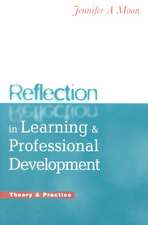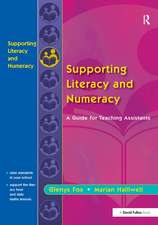How the Best Teachers Avoid the 20 Most Common Teaching Mistakes
Autor Elizabeth Breauxen Limba Engleză Paperback – 30 ian 2009
| Toate formatele și edițiile | Preț | Express |
|---|---|---|
| Paperback (1) | 157.34 lei 43-57 zile | |
| Taylor & Francis – 30 ian 2009 | 157.34 lei 43-57 zile | |
| Hardback (1) | 625.03 lei 43-57 zile | |
| Taylor & Francis – 12 iul 2017 | 625.03 lei 43-57 zile |
Preț: 157.34 lei
Preț vechi: 191.40 lei
-18% Nou
Puncte Express: 236
Preț estimativ în valută:
30.11€ • 31.51$ • 25.06£
30.11€ • 31.51$ • 25.06£
Carte tipărită la comandă
Livrare economică 31 martie-14 aprilie
Preluare comenzi: 021 569.72.76
Specificații
ISBN-13: 9781596671096
ISBN-10: 1596671092
Pagini: 158
Dimensiuni: 178 x 254 x 10 mm
Greutate: 0.29 kg
Ediția:New.
Editura: Taylor & Francis
Colecția Routledge
Locul publicării:Oxford, United Kingdom
ISBN-10: 1596671092
Pagini: 158
Dimensiuni: 178 x 254 x 10 mm
Greutate: 0.29 kg
Ediția:New.
Editura: Taylor & Francis
Colecția Routledge
Locul publicării:Oxford, United Kingdom
Public țintă
Professional Practice & DevelopmentNotă biografică
Meet the Author Elizabeth Breaux is one of the most practical, down-to-earth, informative, and entertaining authors and speakers in education today. She has spoken to audiences across the country where she leaves them laughing, crying, and certain that they have chosen the right profession—teaching. She is the author of three best-selling books: Classroom Management—SIMPLIFIED, How to Reach and Teach ALL Students—SIMPLIFIED, and the coauthor with her sister Annette Breaux of Real Teachers, Real Challenges, Real Solutions.A former curriculum coordinator and classroom teacher, she currently trains and supports new teachers in Lafayette, LA. She is also one of the coordinators of TIPS, an induction program for new teachers in Lafayette, LA. In addition, she trains assessors for the Louisiana Department of Education and is an international presenter for the Bureau of Education and Research.Liz has taught and worked with at-risk students for 24 years and believes that there is not a more challenging and rewarding job in the world. Her message has always been a simple one: “I cannot teach my students until I reach my students.”For information on bringing Elizabeth Breaux to your school or district, contact her at 337-654-0040.
Cuprins
Chapter 1 Mistake 1 : Assuming Students Already Know; Chapter 2 Mistake 2 : Attempting to Control; Chapter 3 Mistake 3: Engaging in Power Struggles; Chapter 4 Mistake 4: Taking Student Behavior Personally; Chapter 5 Mistake 5: Foregoing the Real-Life Connection; Chapter 6 Mistake 6: Teaching to the Whole; Chapter 7 Mistake 7: Allowing for Unstructured Time; Chapter 8 Mistake 8: Failing to Organize; Chapter 9 Mistake 9: Being Unprofessional; Chapter 10 Mistake 10 : Lowering Expectations; Chapter 11 Mistake 11 : Treating Students Unfairly; Chapter 12 Mistake 12: Neglecting Priorities; Chapter 13 Mistake 13: Being Inconsistent; Chapter 14 Mistake 14: Planning Haphazardly; Chapter 15 Mistake 15: Misusing the Administration; Chapter 16 Mistake 16: Delaying Feedback; Chapter 17 Mistake 17: Discouraging Participation; Chapter 18 Mistake 18: Sacrificing the Parent-Teacher Alliance; Chapter 19 Mistake 19: Believing the Façade; Chapter 20 Mistake 20: Refusing to Acknowledge Mistakes; Chapter 21 Conclusion;
Descriere
Descriere de la o altă ediție sau format:
This Research Note explores existence and multiplicity questions for periodic solutions of first order, non-convex Hamiltonian systems. It introduces a new Morse (index) theory that is easier to use, less technical, and more flexible than existing theories and features techniques and results that, until now, have appeared only in scattered journals.
Morse Theory for Hamiltonian Systems provides a detailed description of the Maslov index, introduces the notion of relative Morse index, and describes the functional setup for the variational theory of Hamiltonian systems, including a new proof of the equivalence between the Hamiltonian and the Lagrangian index. It also examines the superquadratic Hamiltonian, proving the existence of periodic orbits that do not necessarily satisfy the Rabinowitz condition, studies asymptotically linear systems in detail, and discusses the Arnold conjectures about the number of fixed points of Hamiltonian diffeomorphisms of compact symplectic manifolds.
In six succinct chapters, the author provides a self-contained treatment with full proofs. The purely abstract functional aspects have been clearly separated from the applications to Hamiltonian systems, so many of the results can be applied in and other areas of current research, such as wave equations, Chern-Simon functionals, and Lorentzian geometry. Morse Theory for Hamiltonian Systems not only offers clear, well-written prose and a unified account of results and techniques, but it also stimulates curiosity by leading readers into the fascinating world of symplectic topology.
This Research Note explores existence and multiplicity questions for periodic solutions of first order, non-convex Hamiltonian systems. It introduces a new Morse (index) theory that is easier to use, less technical, and more flexible than existing theories and features techniques and results that, until now, have appeared only in scattered journals.
Morse Theory for Hamiltonian Systems provides a detailed description of the Maslov index, introduces the notion of relative Morse index, and describes the functional setup for the variational theory of Hamiltonian systems, including a new proof of the equivalence between the Hamiltonian and the Lagrangian index. It also examines the superquadratic Hamiltonian, proving the existence of periodic orbits that do not necessarily satisfy the Rabinowitz condition, studies asymptotically linear systems in detail, and discusses the Arnold conjectures about the number of fixed points of Hamiltonian diffeomorphisms of compact symplectic manifolds.
In six succinct chapters, the author provides a self-contained treatment with full proofs. The purely abstract functional aspects have been clearly separated from the applications to Hamiltonian systems, so many of the results can be applied in and other areas of current research, such as wave equations, Chern-Simon functionals, and Lorentzian geometry. Morse Theory for Hamiltonian Systems not only offers clear, well-written prose and a unified account of results and techniques, but it also stimulates curiosity by leading readers into the fascinating world of symplectic topology.















